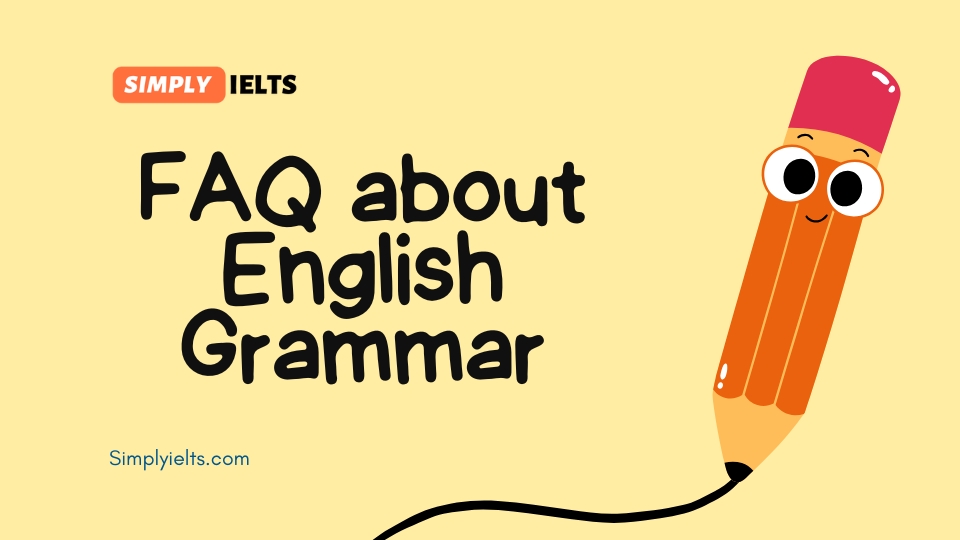FAQ about English Grammar

In this lesson, Simply IELTS will tell you the Frequently asked questions about English Grammar and how to study English grammar step by step online for free.
What is Grammar and why is it important?
Here are some common questions about grammar and their answers:
- What is grammar? Grammar is the set of rules that govern the structure of a language, including the ways in which words can be combined to form sentences and the rules for using words correctly and effectively.
- Why is grammar important? Grammar is important because it helps us communicate clearly and effectively. By using grammar correctly, we can convey our thoughts and ideas in a way that is easily understood by others.
- How do I learn grammar? There are many ways to learn grammar, including taking classes or online courses, using grammar books or other resources, and practicing by reading, writing, and speaking in the language. It’s also helpful to pay attention to how native speakers use grammar and to ask for feedback on your own usage.
- Can I learn grammar without a teacher? Yes, it is possible to learn grammar without a teacher, though a teacher can be a valuable resource and provide personalized instruction and feedback. There are many resources available, such as grammar books and online courses, that can help you learn grammar on your own.
- How do I practice grammar? There are many ways to practice grammar, including doing exercises, reading, writing, and speaking in the language. You can also seek out opportunities to use the language in real-life situations, such as by speaking with native speakers or participating in language exchange programs.
English Grammar For IELTS Exam
Grammar is an important aspect of the IELTS (International English Language Testing System) exam, as it is tested in both the writing and speaking sections. To prepare for the IELTS exam, it’s important to focus on the following aspects of grammar:
- Verb tenses: The IELTS exam tests your ability to use verb tenses accurately and appropriately. Be sure to review the different verb tenses, including present simple, present continuous, past simple, past continuous, and future tenses.
- Modals: Modal verbs (e.g., “must,” “should,” “might”) are used to express possibility, necessity, and other types of conditional meaning. Make sure you understand how to use modals correctly in a variety of contexts.
- Conditionals: Conditionals are used to express a hypothetical or possible situation and its consequences. There are several types of conditionals, including zero, first, second, and third, and it’s important to understand how to use them correctly.
- Adjectives and adverbs: Adjectives and adverbs are used to describe or modify other words in a sentence. Make sure you understand the proper use of these parts of speech and can use them correctly in your writing and speaking.
By focusing on these key aspects of grammar, you can improve your skills and increase your chances of success on the IELTS exam. It’s also a good idea to practice with IELTS-style questions and sample tests to get a feel for the types of questions you will encounter on the exam.
Best Grammar Books for IELTS
Here are a few grammar books that may be helpful for preparing for the IELTS (International English Language Testing System) exam:
- “Grammar for IELTS” by Martin Hewings: This book focuses specifically on the grammar skills needed for the IELTS exam and includes exercises and practice tests to help you prepare.
- “Grammar for English Language Teachers” by Martin Parrott: This book is designed for English language teachers, but it covers a wide range of grammar topics that are also relevant for IELTS preparation.
- “The Cambridge Grammar of English” by Rodney Huddleston and Geoffrey K. Pullum: This comprehensive grammar reference book covers all aspects of English grammar and includes examples and explanations that can be helpful for IELTS preparation.
- “Grammar for IELTS with Answers” by Liam McCarthy: This book includes a wide range of grammar exercises and practice tests, as well as answer keys to help you check your progress.
When choosing a grammar book for IELTS preparation, it’s important to find a book that covers the grammar skills you need to practice and that includes exercises or practice tests to help you apply what you’ve learned. It’s also a good idea to choose a book that is appropriate for your current level of English proficiency.
What are the 12 basic rules of grammar?
There is no one set of “basic rules of grammar” that includes exactly 12 items, as grammar can be quite complex and has many different rules and guidelines. However, here are a few key concepts that are often included in discussions of basic grammar:
- Subject-verb agreement: The verb in a sentence should agree with the subject in number (singular or plural).
- Proper nouns: Proper nouns, such as names of specific people, places, and organizations, should be capitalized.
- Verb tense: Verb tense refers to the time frame in which an action takes place. In English, there are three main tenses: past, present, and future.
- Pronoun-antecedent agreement: A pronoun should agree with the noun it refers to (called the antecedent) in number and gender.
- Sentence structure: A sentence should have a subject and a verb, and should be able to stand alone as a complete thought.
- Using “a” versus “an”: The choice between “a” and “an” depends on the sound of the word that follows it, not the spelling. Use “a” before words that begin with a consonant sound, and use “an” before words that begin with a vowel sound.
- Possessive nouns: To show possession, add an apostrophe and an “s” to the end of a singular noun, and just an apostrophe to the end of a plural noun that ends in “s.”
- Proper punctuation: Use punctuation marks, such as periods, commas, and question marks, to help clarify the meaning of a sentence and to make it easier to read.
- Modifiers: Adjectives and adverbs are words that modify, or describe, other words in a sentence. They should be placed in the correct position in the sentence to clearly convey their meaning.
- Parallelism: In a list or series, all items should be parallel in structure (e.g., all phrases or all clauses).
- Active versus passive voice: In active voice, the subject of the sentence is doing the action. In passive voice, the action is being done to the subject.
- Correct use of “that” versus “which”: “That” is used to introduce essential clauses, while “which” is used to introduce nonessential clauses.
These are just a few examples of the many rules and guidelines that make up the grammar of the English language.
Learning about English grammar
To learn about English grammar, you can start by familiarizing yourself with the basic parts of speech, such as nouns, verbs, adjectives, and adverbs. You can also learn about sentence structure, including the use of subject-verb agreement and proper verb tense.
There are many resources available to help you learn about English grammar, including online courses, books, and language exchange programs. You can also consider hiring a private tutor or joining a class to receive more structured and personalized instruction.
As you learn about grammar, it’s important to practice regularly in order to improve your skills. You can do this by reading, writing, and speaking in English, and by seeking out opportunities to use the language in real-life situations.
Remember to be patient and persistent, and don’t be discouraged by mistakes – they are a natural part of the learning process. With practice and dedication, you can become proficient in English grammar.
How to learn English grammar in 30 days?
It’s not realistic to expect to become proficient in English grammar in just 30 days, as grammar is a complex and nuanced aspect of language learning that requires consistent practice and study over a longer period of time. However, you can make progress in your understanding of English grammar in 30 days by following these tips:
Learning basic grammar is an important foundation for learning any language. Here are a few tips to help you get started:
- Start with the basics: Familiarize yourself with the basic parts of speech, such as nouns, verbs, adjectives, and adverbs. Understanding how these building blocks work will help you understand how sentences are constructed.
- Practice regularly: Consistency is key when it comes to learning grammar. Make time to practice regularly, whether it’s through exercises, reading, or speaking with others.
- Pay attention to sentence structure: Pay attention to the way sentences are constructed, including the use of subject-verb agreement and proper verb tense.
- Use resources: There are many resources available to help you learn English grammar, including online courses, books, and language exchange programs. Find the resources that work best for you and use them to supplement your learning.
- Don’t be afraid to make mistakes: It’s natural to make mistakes when you’re learning a new language. Don’t be discouraged by mistakes – instead, use them as opportunities to learn and improve.
- Focus on one aspect of grammar at a time: It can be overwhelming to try to learn all aspects of grammar at once. Instead, try focusing on one aspect of grammar at a time, such as verb tenses or proper nouns, and gradually build up your understanding of the language.
By setting specific goals, practicing regularly, using resources, and seeking out opportunities to use the language, you can make progress in your understanding of English grammar in 30 days. However, keep in mind that becoming proficient in grammar takes time and consistent practice.
Different ways to study English Grammar
There are many different ways to study English grammar, and the best approach for you will depend on your goals and learning style. Here are a few options you might consider:
- Online courses: There are many online courses available that offer structured lessons on English grammar. Some courses are free, while others require a fee.
- Books: There are also many books available that cover the basics of English grammar. Some books focus on specific aspects of grammar, such as punctuation or verb tenses, while others provide a more comprehensive overview.
- Language exchange programs: If you are interested in practicing your English with native speakers, you might consider joining a language exchange program. These programs allow you to practice speaking with native English speakers in exchange for helping them practice a language you are proficient in.
- Private tutors: You can also consider hiring a private tutor to help you with your English grammar. A tutor can provide personalized instruction and feedback to help you improve your skills.
Regardless of which approach you choose, it’s important to be consistent and practice regularly in order to make progress.





Responses